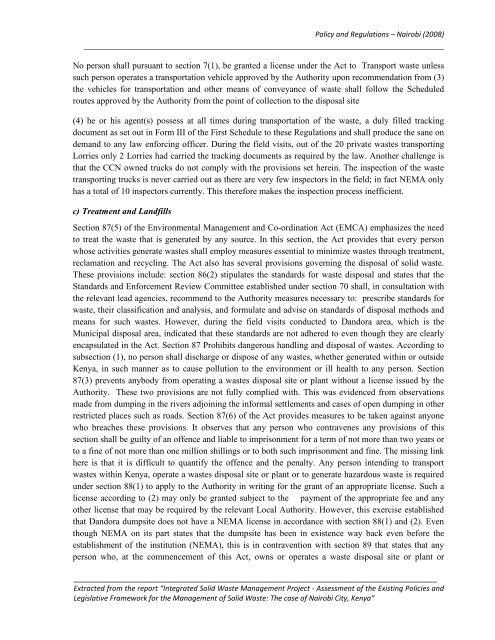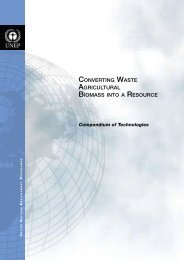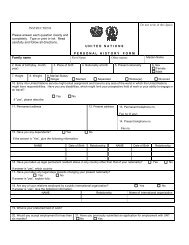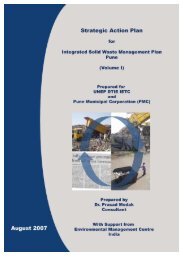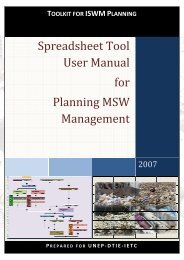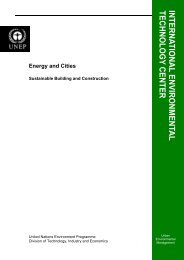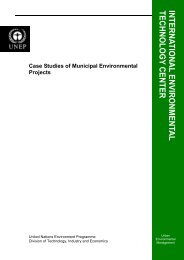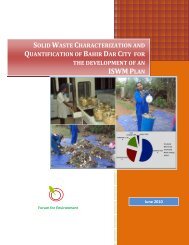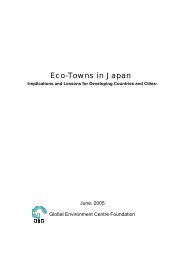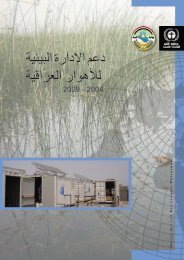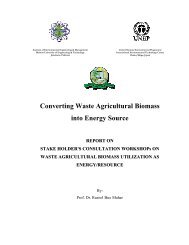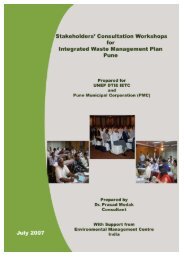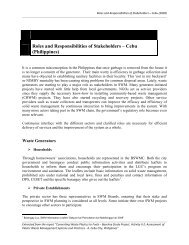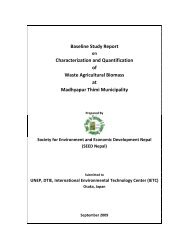Policy and Regulations â Nairobi (Kenya)
Policy and Regulations â Nairobi (Kenya)
Policy and Regulations â Nairobi (Kenya)
You also want an ePaper? Increase the reach of your titles
YUMPU automatically turns print PDFs into web optimized ePapers that Google loves.
<strong>Policy</strong> <strong>and</strong> <strong>Regulations</strong> – <strong>Nairobi</strong> (2008)<br />
_________________________________________________________________________________<br />
No person shall pursuant to section 7(1), be granted a license under the Act to Transport waste unless<br />
such person operates a transportation vehicle approved by the Authority upon recommendation from (3)<br />
the vehicles for transportation <strong>and</strong> other means of conveyance of waste shall follow the Scheduled<br />
routes approved by the Authority from the point of collection to the disposal site<br />
(4) he or his agent(s) possess at all times during transportation of the waste, a duly filled tracking<br />
document as set out in Form III of the First Schedule to these <strong>Regulations</strong> <strong>and</strong> shall produce the sane on<br />
dem<strong>and</strong> to any law enforcing officer. During the field visits, out of the 20 private wastes transporting<br />
Lorries only 2 Lorries had carried the tracking documents as required by the law. Another challenge is<br />
that the CCN owned trucks do not comply with the provisions set herein. The inspection of the waste<br />
transporting trucks is never carried out as there are very few inspectors in the field; in fact NEMA only<br />
has a total of 10 inspectors currently. This therefore makes the inspection process inefficient.<br />
c) Treatment <strong>and</strong> L<strong>and</strong>fills<br />
Section 87(5) of the Environmental Management <strong>and</strong> Co-ordination Act (EMCA) emphasizes the need<br />
to treat the waste that is generated by any source. In this section, the Act provides that every person<br />
whose activities generate wastes shall employ measures essential to minimize wastes through treatment,<br />
reclamation <strong>and</strong> recycling. The Act also has several provisions governing the disposal of solid waste.<br />
These provisions include: section 86(2) stipulates the st<strong>and</strong>ards for waste disposal <strong>and</strong> states that the<br />
St<strong>and</strong>ards <strong>and</strong> Enforcement Review Committee established under section 70 shall, in consultation with<br />
the relevant lead agencies, recommend to the Authority measures necessary to: prescribe st<strong>and</strong>ards for<br />
waste, their classification <strong>and</strong> analysis, <strong>and</strong> formulate <strong>and</strong> advise on st<strong>and</strong>ards of disposal methods <strong>and</strong><br />
means for such wastes. However, during the field visits conducted to D<strong>and</strong>ora area, which is the<br />
Municipal disposal area, indicated that these st<strong>and</strong>ards are not adhered to even though they are clearly<br />
encapsulated in the Act. Section 87 Prohibits dangerous h<strong>and</strong>ling <strong>and</strong> disposal of wastes. According to<br />
subsection (1), no person shall discharge or dispose of any wastes, whether generated within or outside<br />
<strong>Kenya</strong>, in such manner as to cause pollution to the environment or ill health to any person. Section<br />
87(3) prevents anybody from operating a wastes disposal site or plant without a license issued by the<br />
Authority. These two provisions are not fully complied with. This was evidenced from observations<br />
made from dumping in the rivers adjoining the informal settlements <strong>and</strong> cases of open dumping in other<br />
restricted places such as roads. Section 87(6) of the Act provides measures to be taken against anyone<br />
who breaches these provisions. It observes that any person who contravenes any provisions of this<br />
section shall be guilty of an offence <strong>and</strong> liable to imprisonment for a term of not more than two years or<br />
to a fine of not more than one million shillings or to both such imprisonment <strong>and</strong> fine. The missing link<br />
here is that it is difficult to quantify the offence <strong>and</strong> the penalty. Any person intending to transport<br />
wastes within <strong>Kenya</strong>, operate a wastes disposal site or plant or to generate hazardous waste is required<br />
under section 88(1) to apply to the Authority in writing for the grant of an appropriate license. Such a<br />
license according to (2) may only be granted subject to the payment of the appropriate fee <strong>and</strong> any<br />
other license that may be required by the relevant Local Authority. However, this exercise established<br />
that D<strong>and</strong>ora dumpsite does not have a NEMA license in accordance with section 88(1) <strong>and</strong> (2). Even<br />
though NEMA on its part states that the dumpsite has been in existence way back even before the<br />
establishment of the institution (NEMA), this is in contravention with section 89 that states that any<br />
person who, at the commencement of this Act, owns or operates a waste disposal site or plant or<br />
__________________________________________________________________________________<br />
Extracted from the report “Integrated Solid Waste Management Project - Assessment of the Existing Policies <strong>and</strong><br />
Legislative Framework for the Management of Solid Waste: The case of <strong>Nairobi</strong> City, <strong>Kenya</strong>”


